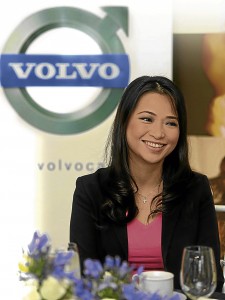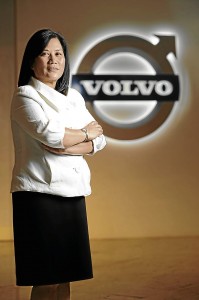There’s a frisson of excitement in the otherwise normally sedate office-cum-showroom and seat of Volvo’s Philippine operations located along Chino Roces Avenue in Makati City. “We are no longer seen as a boring brand,” says Ai Phing Teh, Volvo Cars Asia Pacific (VCAP) regional business manager, who was recently in the country for an annual business review.
Relying on an improving image among consumers, and buoyed by the growing premium car market and an economy that is picking up, Viking Cars Inc. (VCI)/Volvo Philippines has announced plans to open a new dealership office in Alabang, south of the metropolis, and to set up boutique showrooms in key cities outside of Metro Manila with selected trading partners. There will also be mall tours to allow more people to see Volvo cars up close.
This kind of positive energy is something new to Volvo and its local office. In truth, during the past decades, the appeal of Volvo cars had been built year after year on that unexciting-although admirable-proposition of being the world’s safest car.
A Volvo may have a strong reputation for safety as well as a long and respected tradition in innovation, particularly with regards to safety in consumer cars, but it lacked the quick sales appeal that its competitors in the same automotive premium pricing segment had.
However, Volvo’s landscape is slowly changing, and seemingly for the better: its cars without doubt are being noticed by more people.
SUV and safety appeal
Admittedly, the local premium automobile market’s appetite continues to be voracious about SUVs. When the XC series was introduced in the country, heads turned. The XC60 compact crossover SUV, initially manufactured by Volvo Cars at its factory in Ghent, Belgium, was Volvo’s best-selling car in 2009.
This model has a sporty appeal that is strongly reinforced by a fuel efficiency feature boasting of 1,186 kilometers of driving on a full tank of gasoline. And of course, the industry was abuzz with regards the latest Volvo safety technology called City Safety that automatically applies the brakes when the car’s built-in infrared laser sensors detect possible low-speed collision.
In the same breath as previous Volvo safety innovations like the seat belt and ABS, Teh believes that City Safety will become a standard feature in future cars. No one but Volvo, though, can hold claim to be the first to introduce this safety standard. “And we will be introducing more safety features in the future. Safety is owned by Volvo and we don’t want to lose this,” she added.
R&D and fuel prices
New daring designs, at least by Volvo standards, may have persuaded new customers to purchase the brand, but it was the long-standing reputation of Volvo’s diesel engines that could be considered as a core pillar of its strength as a vehicle. And in the Philippines, going diesel has also the cost advantage, especially when one considers the price of today’s fuel.
“You’d be surprised that our customers still consider the lower price of diesel fuel when making a decision,” says Rose Dimalanta, a senior vice president at Viking Cars. Volvos with diesel engines now outsell its gasoline counterparts. And the orders keep coming. Riding on the popularity of diesel engines, Viking will also be selling these for sedan models that had only gasoline engine versions.
Philippine diesel specifications may not be comparable to European standards, but Dimalanta says that Volvo’s imported diesel models have passed through homologation standards so that emission standards are kept to the lowest possible levels without sacrificing on performance levels.
If there is one thing that the world may look forward to with the acquisition by Zhejiang Geely Holding Group, China’s largest private-run car maker, of Volvo Cars last year, it is the increased capability of Volvo to develop better cars for the future, says Teh. “There will be more money for research and development,” she says, even as Geely has vowed to maintain an arm’s length relationship with the Swedish-based management.
A new manufacturing plant is expected to rise soon in China, although this will only supplement the production of an existing production facility in the country. “The demand for Volvos in China remains strong,” says Teh. The company is also looking at expanding its current network of 50 dealerships to 150 in the next three years.
The Philippine operations may pale in comparison with China’s, but to Dimalanta and all the Volvo staff in the country, including those in the Cebu showroom, the dynamic increase of sales in recent months is enough reason to feel giddy.
(VCI/Volvo Philippines, a 100-percent Filipino-owned company established in 1994, is the official authorized dealer and distributor of Volvo cars in the Philippines.)



